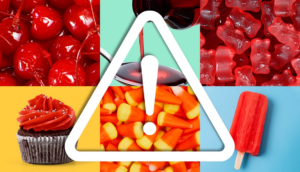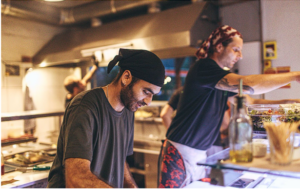- How to Convert Your Food Product Recipe to a Formula (and why!) - February 29, 2024
How to Convert Your Food Product Recipe to a Formula (and why!)
Recipe.. Formula, same thing right?
No! It is important to get your food or beverage recipe converted to a formula before you even start looking to commercialize your product. If you are going to be a real life food business start acting like one and get your product recipe converted to a formula so you’ll be ready to scale up when it’s time!
We talked to Food Scientist Rachel Zemser to give us some advice on how to convert your homemade recipe to a professional industrial formula.
This is a common question asked by first time entrepreneurs and if you present your homemade kitchen recipe (still scribbled on a napkin in grandma’s hand writing) to a co-packer, they are guaranteed to run for the hills.
So what is the difference in a recipe and a formula?
A recipe is what you make at home, using cups, tablespoons and
pinches. A formula is how a professional specialty-food manufacturer documents your information in pounds, kilograms, grams and other weight measurements. These weights are converted to relative percentages and then used to make any amount or batch size of your product.
Why Commercialized Products Need Formulas
When transitioning from a home kitchen to a commercial production line, the stakes are much higher than just following a recipe. Commercialized products demand formulas for a multitude of reasons, paramount among them is the need for consistency and scalability. A formula ensures that each batch of your product, regardless of its size, maintains the same quality, taste, and texture that your customers expect.
Moreover, working with a co-manufacturer, or “co-man,” is an integral part of scaling your food business. Co-mans are equipped with the machinery and expertise to produce large quantities of your product, but they require precise instructions to do so. This is where a well-documented formula comes into play. It provides the co-man with exact measurements and procedures, ensuring that your product remains consistent across different production runs. Without a formula, variations in ingredient proportions can lead to significant deviations in the final product, which can damage your brand’s reputation and reliability.
Real-Life Example
Let’s take a simple home kitchen recipe for lemonade, which might list ingredients such as 1 cup of fresh lemon juice, 1 cup of sugar, and 8 cups of water. This recipe works well for making a single pitcher of lemonade, but what if you need to produce thousands of bottles?
The first step is to convert these volume measurements into weights, as this allows for more precision and consistency in large-scale production. For instance, we would weigh the lemon juice, sugar, and water in grams. Next, we calculate the total weight of the mixture and convert each ingredient’s weight into a percentage of the total. This percentage-based formula can then be scaled up or down without altering the taste and quality of the lemonade.
So put on your scientist hat and get to work. Here is an example of a homemade chocolate chip cooke recipe converted to weights.
Yes literally, weigh it out!
Right from the start, always document your formula by weight. That’s how to ensure the formula remains consistent from bench-top preparation through final production.
Now that you have converted to weight you can easily break it out into percentages. Which is a necessary step in developing your formula.
Converting grams to percentages is a straightforward process. Simply add up the total grams of all your ingredients (in this sample formula, the total weight is 1399.8) and then divide each individual ingredients weight by the total.
Athough this is a very basic example, it gives you an idea of how to convert your recipe to a formula. Then, once you are ready to begin working with a co-packer you will get the formula tested and approved in your manufacturing facility.
The reason it is so important to get your food recipe converted to a formula is now you can easily and accurately scale your production up or down without sacrificing quality. And as we all know Quality Is Everything!



